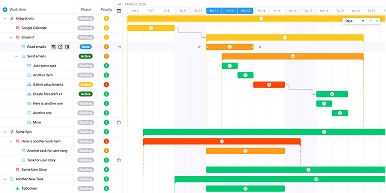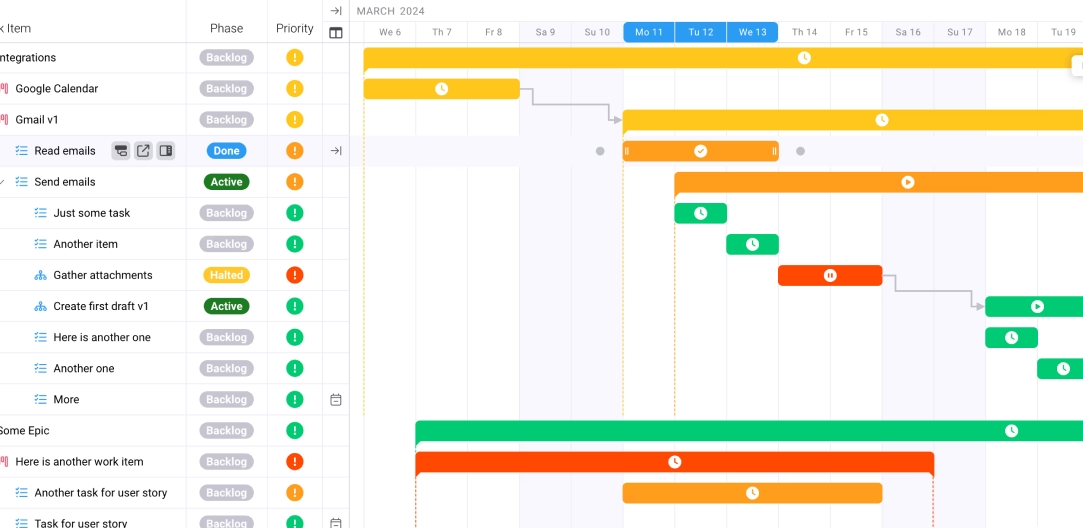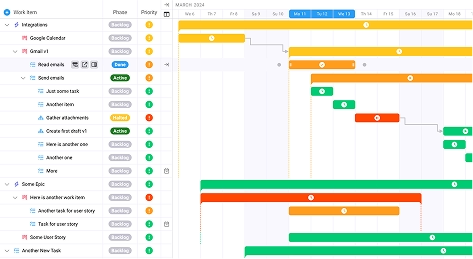
What is the Best Software for Managing Billable Projects?
Key takeaways:
In professional services, choosing the right software for managing billable projects can mean the difference between profit and loss. Recent industry data shows that 77% of high-performing projects use project management software, yet many businesses still struggle with scattered tools and inaccurate billing. The challenge isn't just about tracking time – it's about finding a comprehensive solution that seamlessly integrates project management, time tracking, and billing to maximize profitability while maintaining client relationships.
This comprehensive analysis examines the top software for managing billable projects, focusing on five leading platforms that excel in professional services environments: Ravetree, Harvest, Paymo, Scoro, and Hubstaff.
The Critical Need for Integrated Billable Project Management
Modern professional service firms face unprecedented challenges in project profitability. US employers lose over $400 billion annually because of time theft, while billing inaccuracies and project overruns continue to erode margins. The root cause often lies in disconnected systems that fail to provide real-time visibility into project health and resource utilization.
Over 88% of organizations are using project management software, but adoption doesn't guarantee success. The key differentiator is choosing a platform specifically designed for billable work rather than generic task management tools. Generic project management tools often fail to meet the complex needs of client service businesses because they lack the specialized billing, time tracking, and client communication features that professional services require.
The billing software market reflects this growing demand for specialized solutions. Billing & Invoicing Software Market is projected to reach $13.10 Billion by 2030, driven by businesses recognizing the need for accurate, automated billing processes. Currently, 51.9% of companies now use electronic invoices compared to 48.1% using manual systems, indicating a significant shift toward digital billing solutions.
Strategic Framework for Evaluating Billable Project Software
Selecting the optimal software for managing billable projects requires a systematic approach that goes beyond surface-level features. Professional services firms need comprehensive solutions that integrate time tracking with project management and billing to eliminate data silos and reduce administrative overhead.
The evaluation framework should encompass five critical dimensions: time tracking accuracy, project visibility, billing automation, client collaboration, and scalability. Each dimension directly impacts profitability and operational efficiency.
Time Tracking Precision forms the foundation of billable project success. Accurate time capture ensures every billable minute is recorded and properly allocated to clients and projects. The software should support multiple tracking methods – manual entry, timers, and automated tracking – while providing real-time visibility into team capacity and utilization.
Project Visibility encompasses budget monitoring, resource allocation, and progress tracking. Managers need instant access to project health metrics, including budget burn rates, timeline adherence, and scope changes. This visibility enables proactive decision-making before issues impact profitability.
Billing Automation streamlines the invoice creation process while ensuring accuracy. The system should automatically convert tracked time and expenses into invoices, apply appropriate rates, and handle complex billing scenarios such as retainers, milestone billing, and mixed rate structures.
Client Collaboration features facilitate transparent communication and reduce project friction. Client portals, project updates, and collaborative tools help maintain strong relationships while minimizing administrative burden on project teams.
Scalability ensures the platform grows with your business needs. As teams expand and project complexity increases, the software should accommodate additional users, projects, and advanced features without requiring a complete platform migration.
Top 5 Software Solutions for Managing Billable Projects
Ravetree: The Comprehensive Professional Services Platform
Ravetree stands out as a purpose-built solution for professional service organizations managing billable work. Unlike generic project management tools, Ravetree integrates project management, time tracking, CRM, and billing into a unified platform designed specifically for client service businesses.
The platform excels in providing end-to-end project visibility, from initial opportunity tracking through project delivery and final billing. Client service businesses require specific project management features that generic tools often lack, and Ravetree addresses these gaps with features like advanced project budgeting, multi-rate time tracking, and automated billing workflows.
Ravetree's strength lies in its integration capabilities and industry-specific features. The platform includes sophisticated resource planning tools that help optimize team utilization, while its client portals provide transparency without overwhelming clients with unnecessary complexity.
For organizations seeking a comprehensive solution that eliminates the need for multiple point solutions, Ravetree delivers the specialized functionality required for profitable project delivery. The platform particularly benefits medium to large professional service firms that need sophisticated project accounting and resource management capabilities.
Harvest: The Time Tracking Leader with Strong Billing Integration
Harvest generates $150.1M in revenue as of 2024 and maintains its position as a market leader through consistent innovation and user-focused design. Harvest has a 62.08% market share in time-tracking software, demonstrating its widespread adoption among businesses focused on billable work.
The platform's core strength lies in its intuitive time tracking interface that encourages consistent usage across teams. Harvest makes time entry effortless through multiple capture methods, including browser extensions, mobile apps, and desktop applications that integrate with popular productivity tools.
Harvest's billing features automatically convert tracked time into professional invoices, supporting multiple billing rates, expense tracking, and online payment processing. The platform's reporting capabilities provide insights into project profitability, team utilization, and client performance, enabling data-driven decisions about resource allocation and pricing strategies.
The software particularly appeals to small to medium-sized businesses that prioritize simplicity and ease of adoption. Its clean interface and straightforward feature set make it an excellent choice for teams new to formal time tracking and project billing processes.
However, Harvest's focus on time tracking and billing means it lacks some advanced project management software features that larger organizations might require for complex project coordination.
Paymo: The All-in-One Solution for Growing Teams
Paymo positions itself as a comprehensive solution that combines project management, time tracking, and invoicing in a single platform. The software serves growing teams that need more functionality than simple time tracking but don't require enterprise-level complexity.
The platform's project management features include Gantt charts, Kanban boards, and task dependencies, providing multiple project views to accommodate different working styles. Paymo's time tracking integrates seamlessly with project tasks, ensuring accurate allocation of billable hours to specific work items.
Paymo's billing capabilities include automated invoice generation, expense tracking, and client portal functionality. The platform supports multiple currencies and payment methods, making it suitable for international businesses or those serving global clients.
The software particularly benefits creative agencies, consultancies, and small professional service firms that need project management capabilities beyond basic time tracking. Paymo's strength lies in its balance of features and usability, providing comprehensive functionality without overwhelming users.
Scoro: The Enterprise-Grade Business Management Platform
Scoro takes a comprehensive approach to business management, integrating project management, CRM, billing, and reporting into a unified platform designed for professional service organizations. 48% of Scoro customers are small businesses with fewer than 50 employees, but the platform scales effectively to serve larger enterprises with complex project requirements.
The platform's strength lies in its business intelligence capabilities and advanced reporting features. Scoro provides detailed insights into project profitability, resource utilization, and business performance, enabling sophisticated financial analysis and strategic planning.
Scoro's project management features include resource planning, budget tracking, and milestone management, supported by customizable dashboards that provide real-time visibility into project health. The billing system handles complex scenarios including retainers, recurring billing, and multi-currency transactions.
The platform particularly appeals to established professional service firms that need sophisticated business management capabilities beyond basic project tracking. Scoro's comprehensive feature set makes it suitable for organizations with complex reporting requirements and multiple business lines.
However, Scoro's extensive functionality comes with increased complexity and higher pricing, making it less suitable for small teams or organizations with simple project management needs.
Hubstaff: The Productivity-Focused Time Tracking Solution
166 companies worldwide have started using Hubstaff as a time clock attendance tool, reflecting its growing adoption among businesses focused on productivity monitoring and accurate time tracking for billable work.
Hubstaff differentiates itself through advanced productivity monitoring features, including screenshot capture, activity levels, and application tracking. These features provide detailed insights into how time is spent, enabling managers to identify productivity patterns and optimize resource allocation.
The platform's time tracking capabilities support both automatic and manual time entry, with GPS tracking for field-based workers and detailed reporting for client billing. Hubstaff's invoicing features convert tracked time into professional invoices, supporting multiple billing rates and payment processing.
Hubstaff particularly benefits organizations with remote teams or field-based workers who need detailed productivity insights. The platform's monitoring capabilities help ensure accurate billing while providing accountability for distributed teams.
However, some organizations may find Hubstaff's monitoring features too intrusive, and the platform lacks some advanced project management capabilities found in more comprehensive solutions.
Implementation Best Practices for Billable Project Software
Successful implementation of software for managing billable projects requires careful planning and change management. All-in-one work management platforms deliver better results than disconnected point solutions, but realizing these benefits requires thoughtful deployment and user adoption strategies.
Phase 1: Strategic Planning and Requirements AnalysisBegin by documenting current workflows, identifying pain points, and defining success metrics. Engage key stakeholders from project management, finance, and operations to ensure the selected solution addresses all critical business needs.
Phase 2: Data Migration and System ConfigurationPlan for data migration from existing systems, including historical project data, client information, and billing records. Configure the new system to match your business processes, including billing rates, project templates, and approval workflows.
Phase 3: Team Training and Change ManagementInvest in comprehensive training programs that address different user roles and responsibilities. 92% of people are active within Outlook at least once an hour, highlighting the importance of integrating new tools with existing workflows to encourage adoption.
Phase 4: Gradual Rollout and OptimizationImplement the system gradually, starting with pilot projects or specific teams. Monitor usage patterns, gather feedback, and optimize configurations based on real-world usage patterns.
Measuring Success and ROI
Tracking the impact of billable project software requires establishing clear metrics and monitoring systems. Key performance indicators should include billing accuracy, project profitability, time-to-invoice, and client satisfaction scores.
Financial Metrics focus on revenue impact and cost reduction. Track improvements in billing accuracy, reduction in unbilled time, and increases in project margins. Monitor the time required for administrative tasks like invoice creation and project reporting.
Operational Metrics measure process efficiency and team productivity. Analyze project completion rates, budget adherence, and resource utilization improvements. Track the reduction in manual data entry and administrative overhead.
Client Satisfaction Metrics assess the impact on client relationships and retention. Monitor client feedback on project transparency, communication quality, and billing accuracy. Track client retention rates and project renewal percentages.
Future Trends in Billable Project Management
The software for managing billable projects continues to evolve with advancing technology and changing business needs. Artificial intelligence and automation increasingly handle routine tasks, while advanced analytics provide deeper insights into project performance and profitability.
AI-Powered Automation streamlines time entry, expense categorization, and invoice generation. Machine learning algorithms can predict project outcomes, identify at-risk projects, and recommend resource allocation adjustments.
Enhanced Integration Capabilities connect project management platforms with accounting systems, CRM platforms, and business intelligence tools. These integrations provide comprehensive business visibility while reducing data silos.
Mobile-First Design accommodates the growing trend toward remote and hybrid work arrangements. Modern platforms prioritize mobile functionality, enabling effective project management and time tracking regardless of location.
Advanced Analytics transform project data into strategic insights. Predictive analytics help identify trends, forecast resource needs, and optimize pricing strategies based on historical project performance.
Conclusion
Selecting the best software for managing billable projects requires careful consideration of your organization's specific needs, project complexity, and growth trajectory. Whether you choose Ravetree's comprehensive professional services platform, Harvest's user-friendly time tracking solution, Paymo's balanced feature set, Scoro's enterprise capabilities, or Hubstaff's productivity focus, success depends on proper implementation and user adoption.
The most effective software for managing billable projects seamlessly integrates time tracking, project management, and billing functions while providing the visibility needed to maintain profitable operations. By focusing on platforms designed specifically for professional services rather than generic project management tools, organizations can achieve better outcomes and stronger client relationships.
The investment in purpose-built billable project software pays dividends through improved accuracy, reduced administrative overhead, and enhanced project profitability. As the professional services landscape becomes increasingly competitive, having the right tools becomes not just advantageous but essential for sustainable growth.
Frequently Asked Questions
What features should I prioritize when selecting billable project software?
Focus on integrated time tracking, automated billing, real-time project visibility, client collaboration tools, and scalable reporting capabilities that align with your business size and complexity.
How do I ensure accurate time tracking across my team?
Choose software with multiple time entry methods, mobile accessibility, and integration with existing productivity tools. Provide proper training and establish clear time tracking policies.
Can project management software integrate with my existing accounting system?
Most professional project management platforms offer integrations with popular accounting software like QuickBooks, Xero, and other financial systems to streamline data flow.
What's the difference between generic project management tools and billable project software?
Billable project software includes specialized features like multi-rate time tracking, automated invoicing, client portals, and project profitability reporting that generic tools typically lack.
How can I measure the ROI of billable project management software?
Track metrics including billing accuracy improvements, reduction in administrative time, increased project margins, faster invoice processing, and enhanced client satisfaction scores.
Should small businesses invest in comprehensive project management platforms?
Small businesses benefit from scalable solutions that grow with their needs. Consider starting with core time tracking and billing features, then expanding functionality as requirements evolve.
How important is mobile accessibility for billable project management?
Mobile accessibility is crucial for teams that work remotely, travel frequently, or need to track time across multiple locations. Choose platforms with robust mobile apps and offline capabilities.









